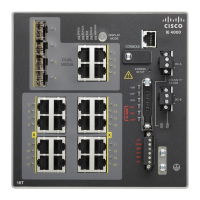826
Configuring IP Unicast Routing
Configuring OSPF
Nonstop Forwarding Awareness
The OSPF NSF Awareness feature is supported for IPv4 in the IP services image. When the neighboring router is
NSF-capable, the Layer 3 switch continues to forward packets from the neighboring router during the interval between
the primary Route Processor (RP) in a router crashing and the backup RP taking over, or while the primary RP is manually
reloaded for a non-disruptive software upgrade.
This feature cannot be disabled. For more information about this feature, see the “Configuring Nonstop Forwarding”
chapter in the High Availability Configuration Guide, Cisco IOS Release 15S.
Configuring Basic OSPF Parameters
Enabling OSPF requires that you create an OSPF routing process, specify the range of IP addresses to be associated
with the routing process, and assign area IDs to be associated with that range.
BEFORE YOU BEGIN
Complete the OSPF network strategy and planning for your network. For example, you must decide whether multiple
areas are required.
Timers LSA group pacing 240 seconds.
Timers shortest path first (spf) spf delay: 5 seconds.
spf-holdtime: 10 seconds.
Virtual link No area ID or router ID defined.
Hello interval: 10 seconds.
Retransmit interval: 5 seconds.
Transmit delay: 1 second.
Dead interval: 40 seconds.
Authentication key: no key predefined.
Message-digest key (MD5): no key predefined.
1. NSF = Nonstop forwarding
2. OSPF NSF awareness is enabled for IPv4 on switches running the IP services image.
Feature Default Setting

